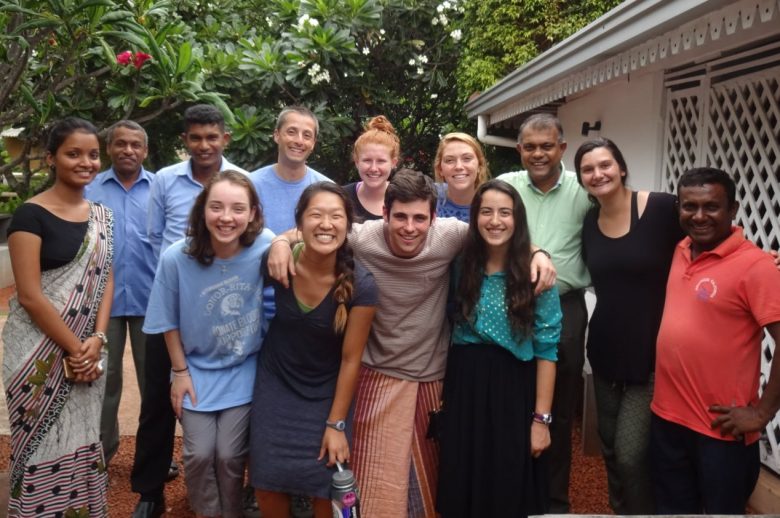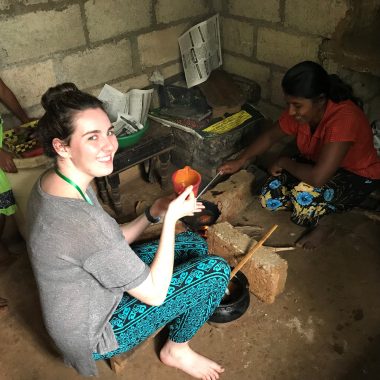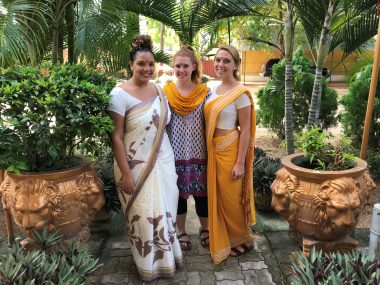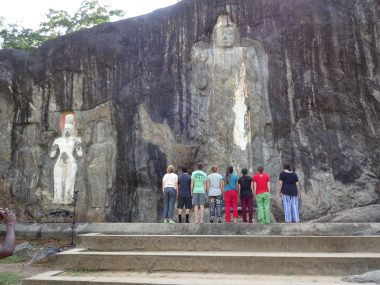Periclean Scholars from the Class of 2019 visited the country three times during three years and conducted extensive research to support an impactful project designed to economically empower local residents. As part of their work, they raised money to help provide residents with fishing equipment that was delivered this month.


Through the Periclean Scholars Program, students complete a series of academic courses with their work culminating in a project that promotes global change and is designed and carried out by students under the direction of their faculty mentor. Past classes have completed projects in Zambia, Namibia, Honduras, Haiti, Mexico and other countries and regions of the U.S.
“We all entered this program together, not know one another and what was coming,” said Periclean Scholar Katie Trumbule ‘19. “We all came to this with different strengths and weaknesses, and we’ve found that we mesh so well. Looking back, we are now so passionate about Sri Lanka, and even those of us who have not visited, we still feel so connected to Sri Lanka.”
The Periclean Scholars program is an intensive initiative that begins with extensive research to better understand the country of focus from economic, social, historical and cultural standpoints. That work helps the cohort determine potential projects to undertake working with a community in the country, said Mat Gendle, director of Project Pericles at Elon, professor of psychology and mentor to the Class of 2019 Periclean Scholars.

That idea was echoed by Camille Kelley ’19, who majored in economics and mathematics. “I was able to work with a group of people, all from diverse backgrounds, that I might not have been able to otherwise,” she said. “This program was about Sri Lanka, but a lot of it was about personal growth that I don’t think I would have had in college without it. The benefits of this program are not only that you’re doing a sustainable humanitarian project, but also for the impact it has on the students.”
After exploring a number of options for their long-term project, the cohort decided to focus on supporting community tourism efforts in partnership with Sarvodaya, the country’s largest and oldest nongovernment organization. The goal was to help with the economic empowerment of local communities by supporting their efforts to build the tourism industry, with visitors enjoying an immersive experience in rural Sri Lanka.
The focus on this project developed not just from the cohort’s research, but from time many in the group spent in Sri Lanka in 2017 and 2018 learning more about the country and community challenges and needs. “When you get on the ground and you see what’s going on, you learn that it’s not just what you think is best, but what your partner organization thinks is best,” said Jill Watkins ‘19, a strategic communications major who is now teaching English in Malaysia. “You have to get your feet on the ground to know what you’re doing with a humanitarian project.”

During Winter Term 2019, another contingent traveled to Sri Lanka to serve as an inaugural group in the new community tourism project. The group participated in a dry run of the tourism program, which included staying the homes of local families and learning local customs and traditions. The goal was to help work out kinks in the logistics and programming and offer feedback as the program prepared to launch.
“The skills we’ve learned through the Periclean Scholars program allows us to be more critical of what we were able to experience while we were there,” said Molly Cruse ’19, who majored in environmental studies. “It allowed us to use all those skills we have worked to develop during the past three years.”
The personal investment these Periclean Scholars have developed in Sri Lanka spawned a secondary project to further assist local communities become more economically independent. The community of Jaffna was visited by the first group from the cohort in 2017 and was in severe need, with many of their basic necessities going unmet. Watkins said the group decided against centering a project around that community because the need was too great for them to tackle, but there was still a desire to do something to help.
That desire took shape as a fundraising effort to help buy fishing equipment for members of the community who had traditionally had to rent their equipment, which made it more difficult to break out of the cycle of poverty. The effort generated $14,000 in contributions, which were used to buy boats and other equipment that have now been put to use.
“This truly offers them a way to become more economically sustainable, to be able to make money, finally, on the fish that they catch,” Trumbule said.


